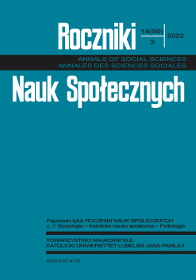Pandemic as a Verifier of Family Ties: Reflections of Representatives of Four Age Groups
Abstract
The coronavirus pandemic has disrupted life in society. Pandemic restrictions separated individuals from social and professional environments. Families began to experience the direct and in-direct effects of the pandemic. Does this specific situation affect family ties? The presented analysis includes a fragment of a wider study that covered representatives of the four groups: aged 13-15, 19-23, 45-59 and 65+. From the interviews conducted, two general positions indicate - strengthening the bond or no change. There are similar observations regarding the impact of the pandemic, but also differences related to the age of the respondents.
References
Brągiel J. (1997), Więzi społeczne w rodzinie, [w:] S. Kawula, J. Brągiel, A.W. Janke, Pedagogika rodziny. Obszary i panorama problematyki, Toruń: Wydawnictwo Adam Marszałek, s. 103-114.
Budzyńska E. (2018), Międzypokoleniowe więzi w rodzinie. Studium socjologiczne rodzin polskich i słowackich, Katowice: Wydawnictwo Uniwersytetu Śląskiego.
Dyczewski L. (2002), Więź między pokoleniami w rodzinie, Lublin: Towarzystwo Naukowe KUL.
Dyczewski L. (1994), Rodzina, społeczeństwo, państwo, Lublin: Towarzystwo Naukowe KUL.
Dyczewski L. (1976), Więź pokoleń w rodzinie, Warszawa: OdiSS.
Evans S., Mikocka-Walus A., Klas A., Olive L., Sciberras E., Karantzas G., Westrupp E.M. (2020), From “it has to stopped our lives” to “spending more time together has strengthened bonds”: The varied experiences of Australian families during covid-19, Frontiers in Psychology, nr 11, https://doi.org/10.3389/fpsyg.2020.588667.
Gilligan M., Suitor J.J., Rurka M., Silverstein M. (2020), Multigenerational social suport in the face of the covid-19 pandemic, Journal of Family Theory&Review, 12, nr 4, s. 431-447.
Giza-Poleszczuk A., Marody M. (2006), W uwięzi więzi (społecznych), Societas Communitas, nr 1(1), s. 21-48.
Gouveia R., Ramos V., Wall K. (2021), Household diversity and the impacts of covid-19 on families in Portugal. Frontiers in Psychology, nr 6, https://doi.org/10.3389/fsoc.2021.736714.
Grodzka D. (1984), Więź rodzinna na tle innych więzi społecznych, Studia Socjologiczne, nr 4, s. 103-122.
Kotlarska-Michalska A. (1992), Więź rodzinna jako szczególny rodzaj więzi społecznej, Roczniki Socjologii Rodziny, t. IV, s. 17-32.
Kotlarska-Michalska A. (2002), Więź w rodzinach wielodzietnych, Roczniki Socjologii Rodziny, t. XIV: Życie rodzinne – uwarunkowania makro i mikrostrukturalne, red. Z. Tyszka, s. 57-70.
Lebow J.L. (2020), Family in the age of covid-19, Family Process, 59, nr 2, s. 309-312.
Luppi F., Rosina A., Sironi E. (2021), On the changes of the intention to leave the parental home during the covid-19 pandemic: a comparison among five European countries, Genus, Springer Open, nr 77(10), https://doi.org/10.1186/s41118-021-00117-7.
Markowska-Manista U., Zakrzewska-Olędzka D. (2020), Rodziny z dziećmi w nowej sytuacji epidemii koronawirusa. Raport z badań online, Warszawa, Rodziny-z-dziecmi-w-nowej-sytuacji-epidemii-koronawirusa-.pdf.
Slany K. (2013), Ponowoczesne rodziny – konstruowanie więzi i pokrewieństwa, [w:] K. Slany (red.), Zagadnienia małżeństwa i rodzin w perpektywie feministyczno-gerontologicznej, Kraków: Wydawnictwo Uniwersytetu Jagiellońskiego, s. 45-64.
Szczepański J. (1970), Elementarne pojęcia socjologii, Warszawa: PWN.
Turowski J. (1959), Przemiany współczesnej rodziny, Zeszyty Naukowe KUL, 2, nr 4, s. 23-54.
Copyright (c) 2022 Roczniki Nauk Społecznych

This work is licensed under a Creative Commons Attribution-NonCommercial-NoDerivatives 4.0 International License.


